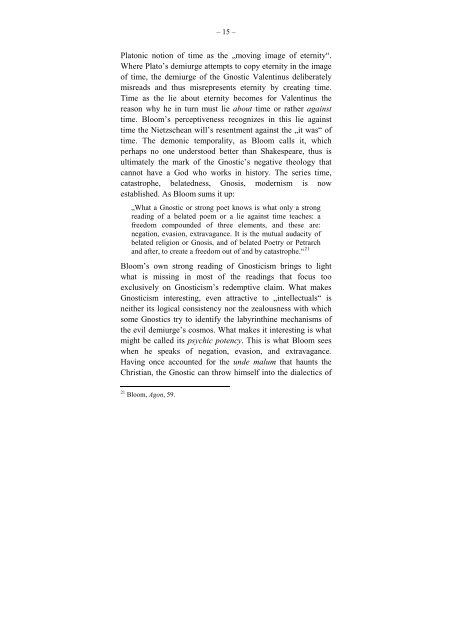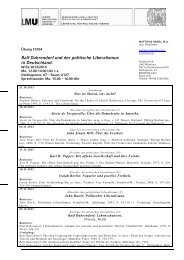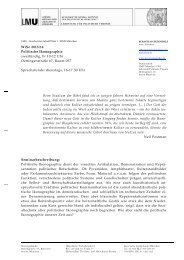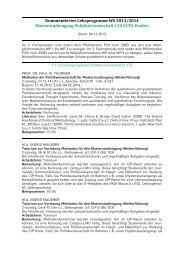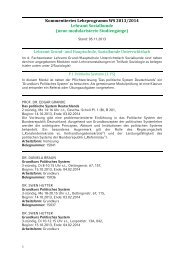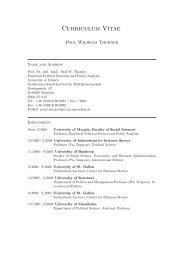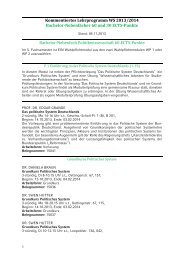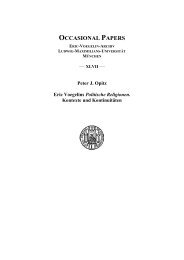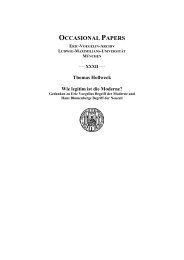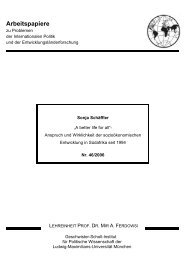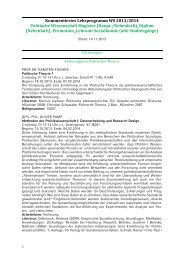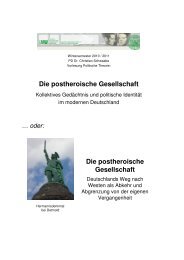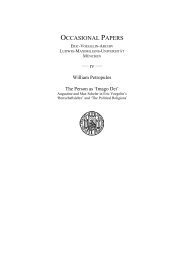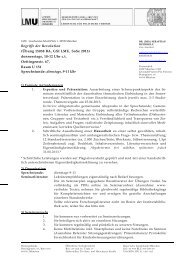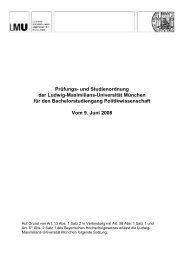THOMAS HOLLWECK is Associate Professor of German at
THOMAS HOLLWECK is Associate Professor of German at
THOMAS HOLLWECK is Associate Professor of German at
You also want an ePaper? Increase the reach of your titles
YUMPU automatically turns print PDFs into web optimized ePapers that Google loves.
– 15 –<br />
Pl<strong>at</strong>onic notion <strong>of</strong> time as the „moving image <strong>of</strong> eternity“.<br />
Where Pl<strong>at</strong>o’s demiurge <strong>at</strong>tempts to copy eternity in the image<br />
<strong>of</strong> time, the demiurge <strong>of</strong> the Gnostic Valentinus deliber<strong>at</strong>ely<br />
m<strong>is</strong>reads and thus m<strong>is</strong>represents eternity by cre<strong>at</strong>ing time.<br />
Time as the lie about eternity becomes for Valentinus the<br />
reason why he in turn must lie about time or r<strong>at</strong>her against<br />
time. Bloom’s perceptiveness recognizes in th<strong>is</strong> lie against<br />
time the Nietzschean will’s resentment against the „it was“ <strong>of</strong><br />
time. The demonic temporality, as Bloom calls it, which<br />
perhaps no one understood better than Shakespeare, thus <strong>is</strong><br />
ultim<strong>at</strong>ely the mark <strong>of</strong> the Gnostic’s neg<strong>at</strong>ive theology th<strong>at</strong><br />
cannot have a God who works in h<strong>is</strong>tory. The series time,<br />
c<strong>at</strong>astrophe, bel<strong>at</strong>edness, Gnos<strong>is</strong>, modern<strong>is</strong>m <strong>is</strong> now<br />
establ<strong>is</strong>hed. As Bloom sums it up:<br />
„Wh<strong>at</strong> a Gnostic or strong poet knows <strong>is</strong> wh<strong>at</strong> only a strong<br />
reading <strong>of</strong> a bel<strong>at</strong>ed poem or a lie against time teaches: a<br />
freedom compounded <strong>of</strong> three elements, and these are:<br />
neg<strong>at</strong>ion, evasion, extravagance. It <strong>is</strong> the mutual audacity <strong>of</strong><br />
bel<strong>at</strong>ed religion or Gnos<strong>is</strong>, and <strong>of</strong> bel<strong>at</strong>ed Poetry or Petrarch<br />
and after, to cre<strong>at</strong>e a freedom out <strong>of</strong> and by c<strong>at</strong>astrophe.“ 21<br />
Bloom’s own strong reading <strong>of</strong> Gnostic<strong>is</strong>m brings to light<br />
wh<strong>at</strong> <strong>is</strong> m<strong>is</strong>sing in most <strong>of</strong> the readings th<strong>at</strong> focus too<br />
exclusively on Gnostic<strong>is</strong>m’s redemptive claim. Wh<strong>at</strong> makes<br />
Gnostic<strong>is</strong>m interesting, even <strong>at</strong>tractive to „intellectuals“ <strong>is</strong><br />
neither its logical cons<strong>is</strong>tency nor the zealousness with which<br />
some Gnostics try to identify the labyrinthine mechan<strong>is</strong>ms <strong>of</strong><br />
the evil demiurge’s cosmos. Wh<strong>at</strong> makes it interesting <strong>is</strong> wh<strong>at</strong><br />
might be called its psychic potency. Th<strong>is</strong> <strong>is</strong> wh<strong>at</strong> Bloom sees<br />
when he speaks <strong>of</strong> neg<strong>at</strong>ion, evasion, and extravagance.<br />
Having once accounted for the unde malum th<strong>at</strong> haunts the<br />
Chr<strong>is</strong>tian, the Gnostic can throw himself into the dialectics <strong>of</strong><br />
21 Bloom, Agon, 59.


